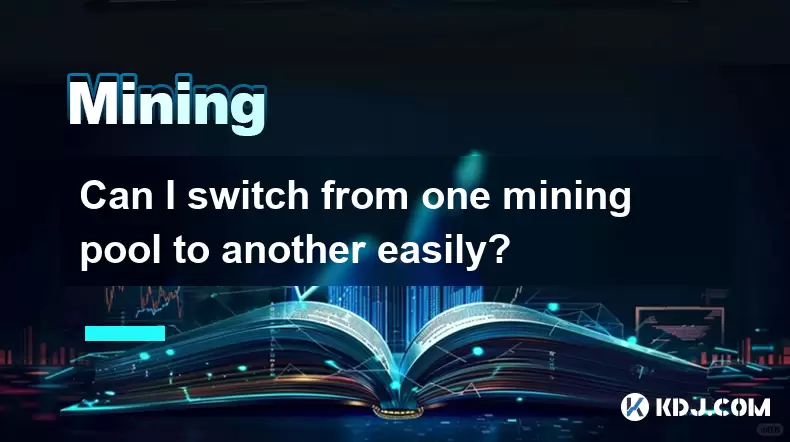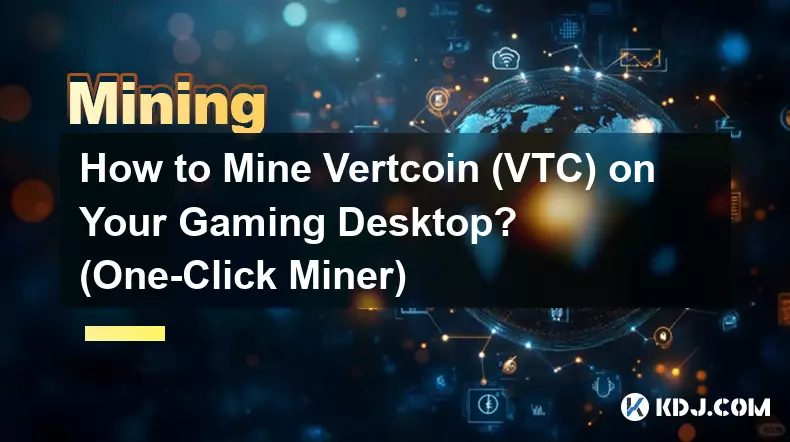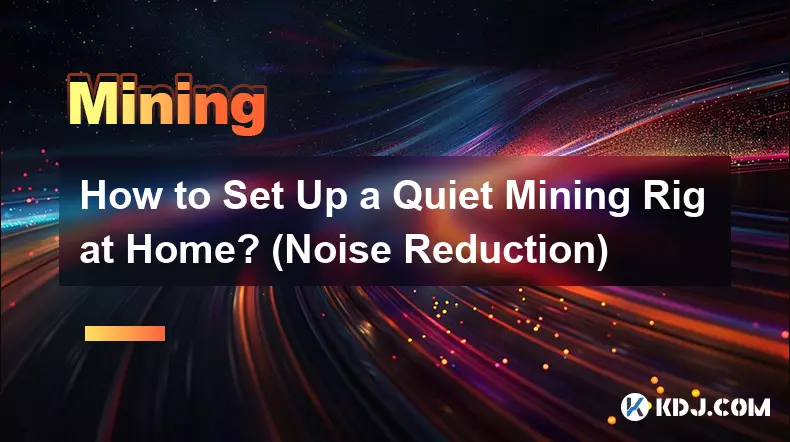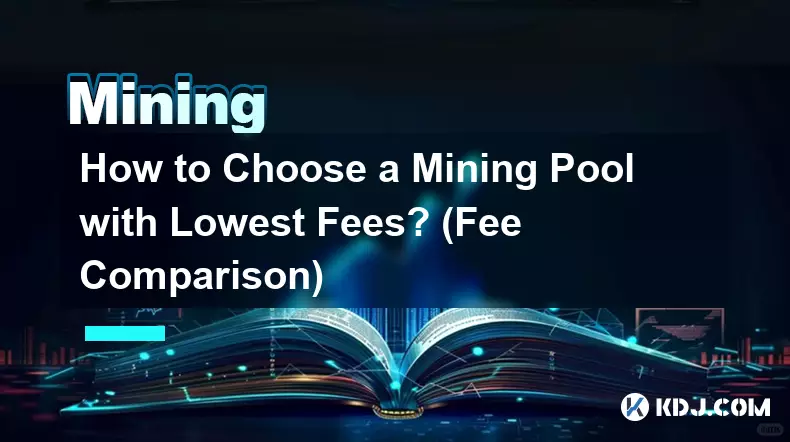-
 bitcoin
bitcoin $87959.907984 USD
1.34% -
 ethereum
ethereum $2920.497338 USD
3.04% -
 tether
tether $0.999775 USD
0.00% -
 xrp
xrp $2.237324 USD
8.12% -
 bnb
bnb $860.243768 USD
0.90% -
 solana
solana $138.089498 USD
5.43% -
 usd-coin
usd-coin $0.999807 USD
0.01% -
 tron
tron $0.272801 USD
-1.53% -
 dogecoin
dogecoin $0.150904 USD
2.96% -
 cardano
cardano $0.421635 USD
1.97% -
 hyperliquid
hyperliquid $32.152445 USD
2.23% -
 bitcoin-cash
bitcoin-cash $533.301069 USD
-1.94% -
 chainlink
chainlink $12.953417 USD
2.68% -
 unus-sed-leo
unus-sed-leo $9.535951 USD
0.73% -
 zcash
zcash $521.483386 USD
-2.87%
Can I switch from one mining pool to another easily?
Miners often switch pools to optimize profitability or reliability, considering factors like payout structures, fees, server stability, and cryptocurrency support.
Jul 05, 2025 at 07:33 pm

Understanding Mining Pools and Their Role in Cryptocurrency Mining
In the realm of cryptocurrency mining, mining pools play a crucial role in enabling individual miners to compete with large-scale operations. A mining pool is a group of miners who combine their computational resources to increase the chances of successfully mining a block. When a block is mined, the rewards are distributed among the participants based on their contributed hash power.
For many miners, especially those using consumer-grade hardware, joining a pool is essential for consistent earnings. However, as conditions change—such as network difficulty, payout structures, or server stability—miners may consider switching from one mining pool to another to optimize profitability or reliability.
Factors Influencing the Decision to Switch Mining Pools
Before deciding to switch pools, miners should evaluate several factors that can impact mining efficiency and income:
- Payout Structures: Some pools use Pay Per Share (PPS), while others rely on Proportional or Score-based models. Understanding how each model affects earnings is critical.
- Pool Fees: Most pools charge a small percentage of mining rewards as fees. These can vary significantly between platforms.
- Server Location and Latency: Proximity to the pool's server impacts connection speed and mining efficiency. High latency can result in stale shares, reducing overall profitability.
- Reputation and Uptime: Reliable pools maintain high uptime and transparent operations. Frequent outages or suspicious behavior can be red flags.
- Cryptocurrency Support: Not all pools support every coin. Miners must ensure the new pool supports the blockchain they're targeting.
Technical Steps Involved in Changing Mining Pools
Switching mining pools typically involves updating the configuration settings in your mining software. Below is a step-by-step guide to facilitate the process:
- Access Your Mining Software Configuration: Whether you're using CGMiner, BFGMiner, or NiceHash, locate the configuration file or GUI where pool settings are defined.
- Note Down Current Pool Details: Before making changes, record your current worker names, passwords, and server addresses for future reference.
- Obtain New Pool Information: Register on the new mining pool platform and obtain the server address, port number, worker name, and password.
- Update Pool Settings: Replace the old pool details with the new ones in your mining software. Ensure there are no typos in the server URL or port number.
- Save and Restart the Miner: Save the updated configuration and restart your mining application to apply the changes.
- Monitor Connection Status: Check the miner logs to confirm successful connection to the new pool. Look for messages like 'Connected to pool' or 'Accepted share'.
Potential Challenges During the Transition
While switching mining pools is generally straightforward, some issues might arise:
- Configuration Errors: Entering incorrect server details can prevent the miner from connecting. Double-check the pool address, port, and worker credentials.
- Worker Name Conflicts: Some pools require unique worker names. If the name you used previously is already taken, you'll need to rename your worker accordingly.
- Delayed Reward Recognition: It may take time for the new pool to recognize your contributions, especially if it uses a score-based reward system.
- Network Instability: If the new pool’s servers experience downtime, your mining activity could be disrupted. Always have backup pool options configured if supported by your mining software.
Best Practices for Smooth Migration Between Mining Pools
To minimize disruptions and maximize efficiency when changing pools, follow these best practices:
- Test with One Rig First: Before migrating your entire setup, test the new pool with a single mining rig to verify compatibility and performance.
- Backup Configuration Files: Keep a copy of your original configuration so you can revert quickly if needed.
- Use Failover Options: Many mining softwares allow setting up multiple pools. Configure a failover pool to automatically switch in case of server issues.
- Check for Algorithm Compatibility: Ensure the new pool supports the same hashing algorithm as your mining hardware. For example, SHA-256 for Bitcoin and Ethash for Ethereum (before the merge).
- Monitor Performance Metrics: After switching, track metrics such as accepted shares, rejected shares, and hash rate to assess whether the move was beneficial.
Frequently Asked Questions (FAQs)
Q: Do I need to stop mining completely when switching pools?A: No, modern mining software allows switching without shutting down the miner entirely. However, restarting the miner after changing configurations ensures the updates take effect properly.
Q: Will my previous mining data transfer to the new pool?A: No, each pool operates independently. Your past mining contributions and balances remain with the original pool and do not carry over.
Q: Can I mine different cryptocurrencies simultaneously across pools?A: Yes, but this requires multi-mining software or separate mining instances. Each instance must connect to its designated pool supporting the respective cryptocurrency.
Q: Is it possible to switch pools automatically based on performance?A: Some advanced mining tools and services offer dynamic pool switching features that monitor performance and profitability, automatically redirecting hash power to the most efficient pool at any given time.
Disclaimer:info@kdj.com
The information provided is not trading advice. kdj.com does not assume any responsibility for any investments made based on the information provided in this article. Cryptocurrencies are highly volatile and it is highly recommended that you invest with caution after thorough research!
If you believe that the content used on this website infringes your copyright, please contact us immediately (info@kdj.com) and we will delete it promptly.
- Ilocos Norte's Vibrant Festival Immortalized on New P100 Coin by BSP
- 2026-02-02 21:55:01
- The Warsh Effect: Bitcoin Takes a Dive as Fed Nominee Sparks Crypto Wipeout
- 2026-02-02 22:05:01
- Your Pocket Change Could Be Gold: Spotting the Valuable £2 Coin Error
- 2026-02-02 22:40:02
- ZAMA Token Launches Globally, Ushering in a New Era for Confidential Blockchains
- 2026-02-02 22:40:02
- LBank Elevates DeFi with GOLDEN FI (GLINK) Listing, Bridging Real-World Assets to the Blockchain
- 2026-02-02 21:30:02
- US Investors Pull Billions from Crypto Funds Amidst Shifting Sentiment, CoinShares Report Highlights
- 2026-02-02 22:35:00
Related knowledge

How to Spot a Cloud Mining Scam? (Red Flags to Watch For)
Feb 02,2026 at 08:20am
Unrealistic Return Promises1. Platforms advertising guaranteed daily returns above 1–2% without disclosing underlying hardware, electricity costs, or ...

How to Earn Passive Income with DePIN Mining? (New Trend 2026)
Feb 01,2026 at 12:40pm
Understanding DePIN Mining Mechanics1. DePIN mining relies on real-world infrastructure participation rather than computational hashing. Users deploy ...

How to Re-paste Your Mining GPUs to Lower Temps? (Maintenance)
Feb 03,2026 at 12:00am
Understanding Thermal Interface Material Degradation1. Over time, thermal paste on GPU dies dries out, cracks, or separates from the die surface due t...

How to Mine Vertcoin (VTC) on Your Gaming Desktop? (One-Click Miner)
Feb 02,2026 at 03:39am
Understanding Vertcoin's Mining Algorithm1. Vertcoin uses the Verthash algorithm, which is intentionally memory-hard and designed to resist ASIC domin...

How to Set Up a Quiet Mining Rig at Home? (Noise Reduction)
Feb 01,2026 at 11:00pm
Acoustic Enclosure Design1. Use rigid, dense materials such as MDF or acoustic-grade plywood for the enclosure walls to block mid-to-high frequency no...

How to Choose a Mining Pool with Lowest Fees? (Fee Comparison)
Feb 02,2026 at 02:39am
Understanding Mining Pool Fee Structures1. Pool operators charge fees to cover infrastructure, maintenance, and administrative costs. These fees manif...

How to Spot a Cloud Mining Scam? (Red Flags to Watch For)
Feb 02,2026 at 08:20am
Unrealistic Return Promises1. Platforms advertising guaranteed daily returns above 1–2% without disclosing underlying hardware, electricity costs, or ...

How to Earn Passive Income with DePIN Mining? (New Trend 2026)
Feb 01,2026 at 12:40pm
Understanding DePIN Mining Mechanics1. DePIN mining relies on real-world infrastructure participation rather than computational hashing. Users deploy ...

How to Re-paste Your Mining GPUs to Lower Temps? (Maintenance)
Feb 03,2026 at 12:00am
Understanding Thermal Interface Material Degradation1. Over time, thermal paste on GPU dies dries out, cracks, or separates from the die surface due t...

How to Mine Vertcoin (VTC) on Your Gaming Desktop? (One-Click Miner)
Feb 02,2026 at 03:39am
Understanding Vertcoin's Mining Algorithm1. Vertcoin uses the Verthash algorithm, which is intentionally memory-hard and designed to resist ASIC domin...

How to Set Up a Quiet Mining Rig at Home? (Noise Reduction)
Feb 01,2026 at 11:00pm
Acoustic Enclosure Design1. Use rigid, dense materials such as MDF or acoustic-grade plywood for the enclosure walls to block mid-to-high frequency no...

How to Choose a Mining Pool with Lowest Fees? (Fee Comparison)
Feb 02,2026 at 02:39am
Understanding Mining Pool Fee Structures1. Pool operators charge fees to cover infrastructure, maintenance, and administrative costs. These fees manif...
See all articles










































































